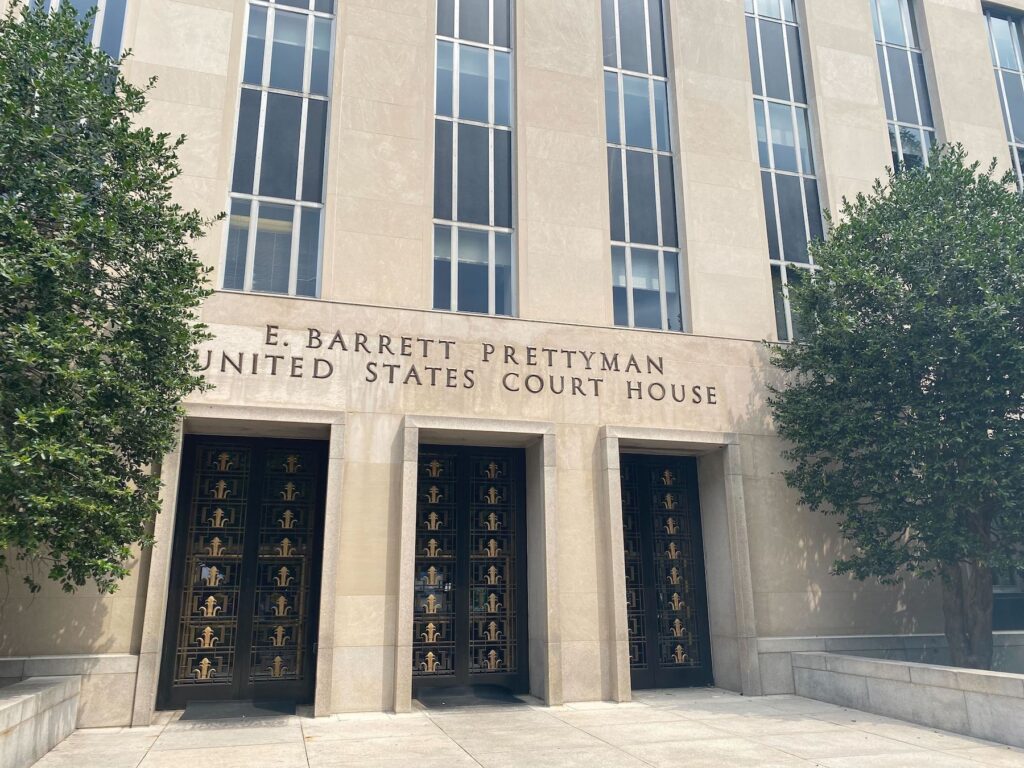
The front entrance of the E. Barrett Prettyman U.S. Courthouse in Washington, D.C., on Aug. 3, 2023. (Jennifer Shutt/States Newsroom)
WASHINGTON — Judges on a federal appeals court panel seemed skeptical that the Trump administration’s expanded use of a fast-track deportation procedure didn’t violate the due-process rights of immigrants during oral arguments Monday.
The hearing before judges Patricia A. Millett, Neomi Rao and J. Michelle Childs of the D.C. Circuit U.S. Court of Appeals comes after a lower court struck down the expedited removal policy used to bypass judicial review in the quick removals of migrants far from the southern border. The expanded policy is a pillar in the Trump administration’s mass deportation campaign.
“This is a critical tool of immigration enforcement,” U.S. Department of Justice attorney Drew Ensign said. “This is not a small deal. The ability to conduct expedited removal is one of the executive’s most important tools for maintaining border control and not being overwhelmed.”
For decades, presidential administrations have applied expedited removal to immigrants apprehended at the southern border who cannot prove they have remained in the country for more than two years. If they cannot produce that proof, those immigrants are then subject to deportation without appearing before an immigration judge.
In January, the Trump administration expanded expedited removal to apply nationwide, rather than only within 100 miles of the southern border.
Childs said the Trump administration can still use expedited removal, along with other enforcement tools, for its immigration policy.
“So what are you losing, other than (applying expedited removal to) millions of other people, to go inward into the U.S.?” Childs asked.
Former President Barack Obama appointed Millett, former President Joe Biden appointed Childs, and President Donald Trump appointed Rao in his first term.
Policy lacks procedure
Arguing on behalf of the immigration advocacy group that brought the suit, Make the Road New York, attorney Anand Balakrishnan said the new policy “brings to bear against this new class of people an entire system of expedited removal that is not procedurally adequate.”
The judges also questioned the legality of the Trump administration’s expanded use of expedited removal.
Ensign argued that the Trump administration doesn’t believe the expansion violates due-process rights because those affected are not U.S. citizens.
“It has been well-established that aliens who are not lawfully admitted into the country are only entitled to whatever procedures the political branches provide, and that the plaintiffs cannot rely on the due-process clause to impose additional procedural requirements,” Ensign said.
Balakrishnan said that when the Trump administration expanded the use of the policy in January, there were no new procedures put in place, meaning immigrants wanting to challenge their removal under the new policy would have no way to do so.
“The procedures that have been on the books, in some cases are not tailored for this radically new class to which it’s being applied, and in other cases, are insufficient to deal with the unique challenges placed by them and the liberty interests of this new group,” Balakrishnan said.


![[Aggregator] Downloaded image for imported item #1156996](https://whitecounty.com/wp-content/uploads/2025/10/prettyman-courthouse-1-state-80-1691106815-1024x768-1-696x522.jpg)


